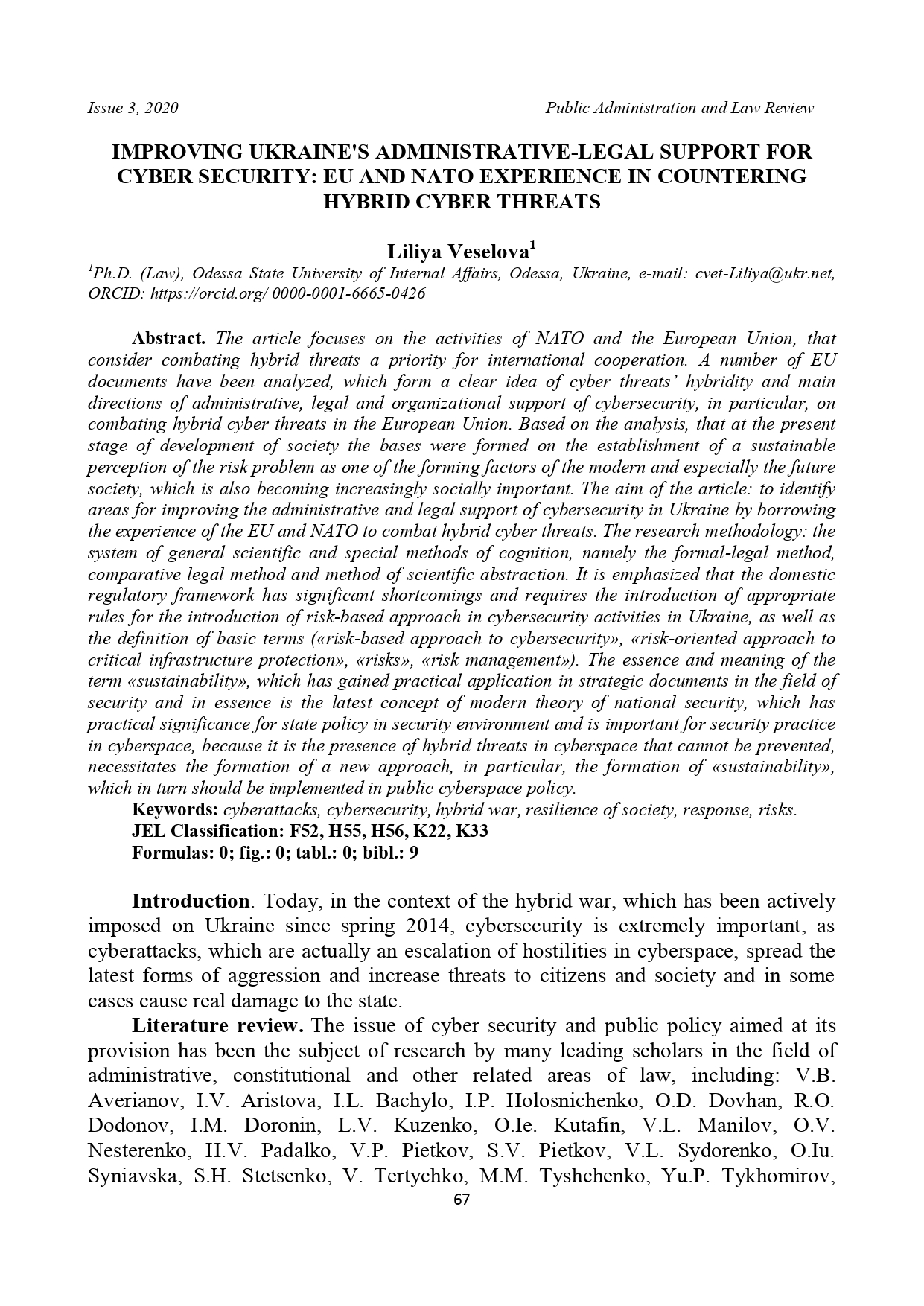IMPROVING UKRAINE'S ADMINISTRATIVE-LEGAL SUPPORT FOR CYBER SECURITY: EU AND NATO EXPERIENCE IN COUNTERING HYBRID CYBER THREATS
DOI:
https://doi.org/10.36690/2674-5216-2020-3-67Keywords:
cyberattacks, cybersecurity, hybrid war, resilience of society, response, risksAbstract
The article focuses on the activities of NATO and the European Union, that consider combating hybrid threats a priority for international cooperation. A number of EU documents have been analyzed, which form a clear idea of cyber threats’ hybridity and main directions of administrative, legal and organizational support of cybersecurity, in particular, on combating hybrid cyber threats in the European Union. Based on the analysis, that at the present stage of development of society the bases were formed on the establishment of a sustainable perception of the risk problem as one of the forming factors of the modern and especially the future society, which is also becoming increasingly socially important. The aim of the article: to identify areas for improving the administrative and legal support of cybersecurity in Ukraine by borrowing the experience of the EU and NATO to combat hybrid cyber threats. The research methodology: the system of general scientific and special methods of cognition, namely the formal-legal method, comparative legal method and method of scientific abstraction. It is emphasized that the domestic regulatory framework has significant shortcomings and requires the introduction of appropriate rules for the introduction of risk-based approach in cybersecurity activities in Ukraine, as well as the definition of basic terms («risk-based approach to cybersecurity», «risk-oriented approach to critical infrastructure protection», «risks», «risk management»). The essence and meaning of the term «sustainability», which has gained practical application in strategic documents in the field of security and in essence is the latest concept of modern theory of national security, which has practical significance for state policy in security environment and is important for security practice in cyberspace, because it is the presence of hybrid threats in cyberspace that cannot be prevented, necessitates the formation of a new approach, in particular, the formation of «sustainability», which in turn should be implemented in public cyberspace policy.
Downloads
References
Spivpratsia zarady protydii hibrydnym zahrozam [Cooperation to counter hybrid threats]. URL: https://www.nato.int/docu/review/uk/articles/2018/11/23/spvpratsya-zaradi-protid-gbridnim-zagrozam/index.html [Ukraine].
Joint Communication to the European Parliament and the Council Joint Framework on countering hybrid threats a European Union response. 2016. URL: https://eur-lex.europa.eu/legal-content/EN/TXT/?uri=CELEX%3A52016JC0018.
Joint Report to The European Parliament and the Council on the Implementation of the Joint Framework on countering hybrid threats - a European Union response. 2017. URL: https://eur-lex.europa.eu/legal-content/EN/TXT/?uri=CELEX%3A52017JC0030.
Joint Report to the European Parliament, the European Council and the Council on the Implementation of the Joint Framework on countering hybrid threats from July 2017 to June 2018. URL: https://eur-lex.europa.eu/legal-content/EN/TXT/?uri=JOIN:2018:014:FIN.
Joint Staff Working Document Report on the implementation of the 2016 Joint Framework on countering hybrid threats and the 2018 Joint Communication on increasing resilience and bolstering capabilities to address hybrid threats. URL: https://eeas.europa.eu/sites/eeas/files/report_on_the_implementation_of_the_2016_joint_framework_on_countering_hybrid_threats_and_the_2018_joint_communication_on_increasing_resilien.pdf.
UN General Assembly resolution 57/329, adopted at the 78th plenary session of the 57th session. 20.12.2002. URL: https://documents-dds-ny.un.org/doc/UNDOC/GEN/N02/555/24/PDF/N0255524.pdf?OpenElement.
Dovhan O.D., Doronin I.M. (2017) Eskalatsiia kiberzahroz natsionalnym interesam Ukrainy ta pravovi aspekty kiberzakhystu [Escalation of cyber threats to the national interests of Ukraine and legal aspects of cyber defense], Kiev, 107 p. [Ukraine].
Propozytsii do polityky shchodo reformuvannia sfery kiberbezpeky v Ukraini. [Proposals for policy on cybersecurity reform in Ukraine]. Material dlia obhovorennia [Material for discussion]. URL: https://parlament.org.ua/wp-content/uploads/2017/12/au_White-book-on-cybersecurity-draft_5.pdf [Ukraine].
Dyrektyva Yevropeiskoho Parlamentu I Rady (IeS) 2016/1148 vid 06.07. 2016 pro zakhody dlia vysokoho spilnoho rivnia bezpeky merezhevykh ta informatsiinykh system na terytorii Soiuzu [Directive of the European Parliament and of the Council (EU) 2016/1148 of 06.07. 2016 on measures for a high common level of security of network and information systems in the Union.]. URL: https://zakon.rada.gov.ua/laws/show/984_013-16/find?text=%F0%E8%E7%E8%EA [Ukraine].

Additional Files
Published
How to Cite
Issue
Section
License
Copyright (c) 2020 Scientific Center of Innovative Researches OÜ

This work is licensed under a Creative Commons Attribution 4.0 International License.





